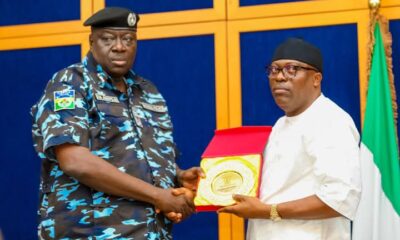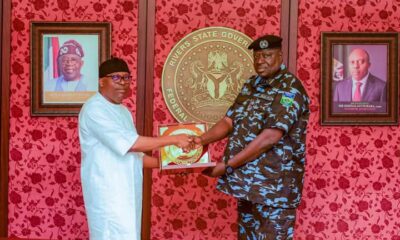Environment
Council Canvasses For Policies On Sanitation Ownership
The Water Supply and
Sanitation Collaborative Council (WSSCC) has urged the Federal Government to put policies in place to enable its citizens take ownership of sanitation and hygiene in their locality.
WSSCC Programme Support Officer, Matilda Jerneck , told newsmen in Abuja, recently, that this was necessary to scale up access to Water, Sanitation and Hygiene (WASH).
She said development partners alone would not be able to drive the change.
According to her, they can only act as catalysts for scaling up sanitation and thereby reduce the number of persons dying from water -borne diseases in the country.
She said the country could not achieve much in terms of scaling up sanitation, if it failed to put measures in place to encourage all Nigerians to making sanitation a priority.
“Nigeria needs to take ownership of scaling up its activities for water, sanitation and hygiene. It is an entry point to wider development; that is why we need to do something fast.”
According to her, no fewer than 2.5 billion persons globally, lack access to decent sanitation and more than a billion defecate in the open.
“Diarrhoeal disease, largely caused by poor sanitation and hygiene, is a leading cause of malnutrition, stunting and child mortality, claiming nearly 600,000 under-five lives every year.
“Inadequate facilities also affect education and economic productivity and impact the dignity and personal safety of women and girls.”
Jerneck said that the WSSCC, through the Global Sanitation Fund (GSF) works through behavioural activities to help large numbers of poor people in the hardest-to-reach areas attain safe sanitation and adopt good hygiene practices.
These activities, she said, were community-led, support national efforts, which brought together a diverse group of stakeholders to address, at a large scale, the severe deficiencies in access to sanitation and hygiene.
On the outcome of the recently concluded mission visit to GSF-supported states of Benue and Cross River, Jerneck said there was the need for such states to pay up counterpart funds to scale up hygiene and sanitation.
She said the GSF, between 2013 and 2014 alone, reported an almost 90 per cent increase in the number of people living in open-defecation free environment in 13 countries across Africa and Asia.
Meanwhile, Mr Nanpet Chuktu, the GSF National Programme Officer, also told NAN that since the beginning of the programme, 340,000 communities in six local government areas in Benue and Cross River had stopped open defecation.
He said through the Rural Sanitation and Hygiene Promotion in Nigeria (RUSHPIN) Programme of the GSF, no fewer than 741 communities, had been triggered on Community-Led Total Sanitation practices.
Chuktu said there was the need for more commitment from all stakeholders to carry out monitoring in sustaining achievement recorded in reducing open defecation.
Environment
Flooding Prediction: Port Harcourt Tasked On Waste Management

Some residents of Port Harcourt and its environs have reacted to the impending flooding in parts of the country, including Rivers state.
It would be recalled that the federal government last week predicted flooding in some states in the country, including Rivers State.
A cross session of residents who spoke to The Tide on the issue said time has come for residents to be careful about the way they managed their waste, especially at this time of the year.
According to them, people must avoid blocking water channels as well as indiscriminate dumping of waste into water channels.
Speaking with The Tide, an Environmentalist, Elder Blessing Jackson Tiko, called for caution by residents of Port Harcourt and its environs
Tiko who was a former deputy operational officer Phalga Environmental Sanitation Taskforce, said people must be conscious of the way and manner that they manage their waste.
“We know that we have the rain and if you watch it is coming especially this month of July,it would rain and rain and rain
“We have to be very conscious of how we manage our environmental system, the way we throw our waste and how we evacuate it so that every where will be open for water to move freely
“Water doesn’t want blockage, water wants free flow, ’he said
Tiko urged state governments to liaise with the federal government and development agencies to dredge and open up river channels to enable Water move freely.
He particularly called on the Niger Delta Basine Development Authority and the Niger Delta Development Commission to liaise with state governments in the quest to end flooding in the states.
Also speaking, Mrs. Alice. A. Alabo a trader at Mile 3 Port Harcourt, urged the state government to do something on the constant flooding at the Abuja bypass in Mile 3 Diobu, Port Harcourt,
She said the bypass is always flooded at every little rainfalls stressing that something must be done about it.
Alabo also told The Tide Correspondents that the Abuja bypass has no receptacles and called on the management of the Rivers State Waste Management Agency to provide receptacles for the people, to ensure proper waste disposal in the area.
“The government should provide us with receptacles for us to properly place our waste which is causing the flooding in the area.
A shop owner Dickey, Livia Marko lemanted the incessant flooding along the Abuja bypass, adding that the situation is affecting their businesses.
“We have been begging the Rivers State Government and the local government to come to our aid.
“The Ego Line Progressive Union contributes N10,000 every year to make sure that we evacuate the drainage.
“We called the Hausa boys to come and clean from the beginning to the end of the tunnel which leads to the Interwoba
“So immediately after each rainfall within 10 minutes it will dry otherwise we cannot stay in our shop.
“I am begging the government to come to our rescue, even if they want to open the gutter or canal. It will help in preventing the flooding or they should clean the gutters starting from Ikwerre Road to the Interwoba axis”, he said
On his part,Mr. Ajaka Olawa, lamented that the flooding in Timber area by Abuja bypass area is so terrible that no businesses can easily be carried on in the area.
He blamed it on the continuous blockage of drainages
. “I can’t remember the last time the government came to clean the drainage, so when it rains we find it difficult to stay here.
“Some of our shops are wet because of the flooding. And if the rain falls heavily, we pack our goods. If not. they get damaged, and I am expecting this message to reach the government for them to do something about it”
“The people, the government gives the job are not being followed up, that’s why the road is still looking bad,
“The government is trying, but they should put more effort to make sure that the jobs are being carried out.
Also, Mr. Chukuma said, during the flooding along Abuja bypass by Timber, no activities take place.
He said that if rain falls, either little or heavy, none can use the road because the road will be inundated by water. Sometimes it takes two to three days for the water to dry.
According to him, eight years ago, the former governor was here to see things for himself, but nothing happened till he left office.
By: Victoria Gilbert / Ossia Victory
Environment
Monitor Your Environment, Report Incidents Of Pollution Early, HOMEF Tells Community

Following the rising impact of toxic waste in the Niger Delta communities in Nigeria, an Ecological Think Tank, Health of Mother Earth Foundation, HOMEF, has urged oil-producing communities in the region to monitor their environment and report incidents of pollution or other environmental hazards in real time to appropriate authorities.
The Project Manager, Communities and Culture, HOMEF, Cadmus Atake gave the advice last Friday during a Community Environmental Monitoring Training for the people of Nembe, Town-Brass in Bayelsa and Eastern Obolo, Akwa Ibom States respectively which was held in Eket Local Government Area of Akwa Ibom State.
Atake said though the extractive activities of oil companies have impacted negatively on the communities, the people still have a role to play in protecting the environment by not throwing plastics in the water bodies or engaging in activities inimical to the environment.
He said, “The purpose is to train the people on how they can monitor their environment that has been impacted by extractive activities, for them to observe the changes that occur in their environment and things they see when they go out to fish.”
Atake also harped on the need for documentation and reporting of the identified environmental challenges or pollution, saying that monitoring without reporting would be an effort in futility even as he tasked them with the accuracy, authenticity and originality of data without any mutilation.
He encouraged people to use mobile phones to take real-time photos and videos without editing the images in the case of pollution or oil spills.
His words, “Reporting is an essential aspect of any monitoring activity. It affords the opportunities to track the activity and its impacts. It makes an activity visible and draws attention to it. Also, it helps to identify associated risks and to know the required controls and learning outcomes needed to prevent the reoccurrence of failures of an activity. No monitoring exercise is complete without a report of observations and a point of action.
“You must identify what caused the pollution, state the name of the community and landmark and if possible, use GPS, time and date the pollution was observed.”
One of the participants, OmusuoDieworio from Bayelsa State noted that apart from the activities of the multinationals, the people have contributed to the disappearance of fishes in the rivers by dumping refuse and plastic wastes inside the river which posed a great threat to fishes even as he urged community leaders to promulgate laws prohibiting that and the youth leaders to ensure the enforcement.
“Our people should be sensitized on the hazards of toxic waste. We should put laws that are binding on us. Our fishermen should discipline themselves enough after drinking sachet water eating should not drop the waterproof inside the water. They should also be discouraged from using dynamite and other chemicals for fishing as all these are harmful to both the aquatic animals and human beings that will consume it.” He said.
Speaking on the Petroleum Industry Act, PIA, UmoIsua-Ikoh of the Peace Pact Development Foundation, said the provision in the PIA where the community should forfeit its 3% development fund in case of pipeline vandalism criminalizes the community and should be expunged noting that no community will agree to vandalize pipeline but an individual or a criminal.
He said they should go after anyone who vandalises pipelines and not make the entire community bear the brunt of one person.
On his part, Stephen Oduware, the Program Manager at Fossil Politics, called on the communities to network with CSOs, CBOs, doctors, lawyers, media especially those from their communities and other community members who have the community at heart to advocate at all fronts.
“The community people should partner with CSOs, CBOs so that they will be able to advocate from all fronts from the health implication of this pollution from the legal and human right violations as a result of this pollution, land grabbing and then they will be able to get well-researched works from the academics, we believe that with this network they will be able to push for the justice they needed.” He said.
Environment
Delta Vows To Tackle Climate Change

The Delta State Govern-
ment says it is working hard to tackle the issue of climate change in the state.
Special Adviser to the state Governor on Sustainable Development Goals) (SDGs, Lady Diana Eyo _Enoette, said this in an interview with newsmen during the launching of Green City Project in Port Harcourt.
She said the government was doing this by raising awareness on the impact of climate change in the State and also control the indiscriminate dumping of waste across the State.
Eye-Emoette said government has also setup scouts across the State to embark on tree planting campaign in all nooks and crannies of Delta State.
She said time has come for governments across the Niger Delta region to create more awareness on climate change, adding that continuous human activities in the region have made it vulnerable to climate change
Diana described her government as a leading voice on climate change as far as the Niger Delta region is concerned and stressed the need for other governments in the region to follow suit.
She said Green City’s initiatives have become a potent weapon in fighting climate change, stressing that the initiative is coming at the appropriate time.
The special advise said governments across the country should key into the green city’s projects inorder to reduce carbon emissions into the atmosphere.
Meanwhile, a university teacher, Professor Magnus Onuoha, has called for conscious efforts by governments across Africa to check carbon emissions.
The university teacher also described the green city’s initiatives as a safe avenue for emerging cities in Africa.
Prof Onuoha, who spoke via videophone described the project as innovative, adding that climate change is real and no longer fallacies.
According to him “it is glaringly telling on our faces and the possibility of it going away is not there”.
He said.
By: John Bibor
-

 Featured3 hours ago
Featured3 hours agoNigeria, S/Arabia, Deepen Ties On Solid Mineral Exploration
-
Niger Delta3 hours ago
RSBOPP Moves To Review Procurement Processes
-

 News3 hours ago
News3 hours agoTUC Rejects VAT Hike, Urges Pro-people Tax Reforms
-

 Business3 hours ago
Business3 hours agoCBN Predicts 4.17% GDP Growth In 2025
-
Rivers3 hours ago
100 Days: Omuma Council Boss Lists Achievements
-

 Featured2 hours ago
Featured2 hours agoTinubu Pledges Peace, Justice, Development in Ogoniland….Fubara Lauds President on Peace Talks
-

 Featured5 hours ago
Featured5 hours agoFG, States, Local Govts Share N1.42trn In January
-

 News2 hours ago
News2 hours agoDon’t Attend Nocturnal Meetings To Declare War On Rivers, Fubara Tells New CP

